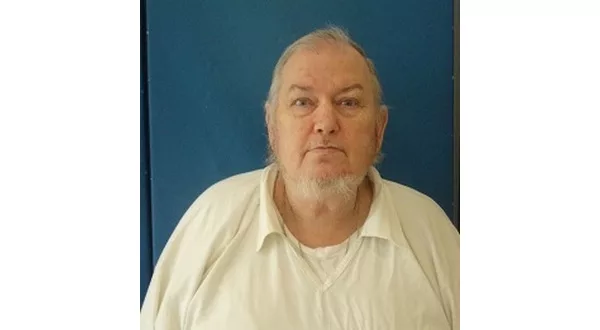
Photo courtesy of the Arkansas Department of Corrections
The Arkansas Court of Appeals has denied post-conviction relief for Robert Dean Penny who is currently serving a 25-year prison sentence for shooting and killing his landlord.
The Appeals Court Decision was released Wednesday.
The 65-year-old Penny was initially charged with first-degree murder in early December 2017. It was alleged he had initially shot his landlord, then 71-year-old Chester Hornowski, 18 times, reloaded and fired four more bullets into the body.
At his trial in mid-September 2019, a Baxter County Circuit Court jury found him guilty of second-degree criminal mischief and one count of aggravated assault, acquitted him of a second count of aggravated assault and deadlocked on a first-degree murder charge.
He was sentenced to six years in prison on the criminal mischief and aggravated assault charges. The jury recommended the sentence be stacked giving Penny 12 years to serve.
NO DECISION ON MURDER CHARGE
A mistrial was declared after the jury reported it was unable to reach consensus as to Penny’s guilt or innocence on the murder charge after deliberating for about six hours.
Penny wasted no time in appealing his initial 12-year sentence, alleging that now retired Circuit Judge Gordon Webb did not exercise discretion available to him when he accepted the jury’s recommendation and allowed the two six-year sentences for aggravated assault and criminal mischief to be stacked.
The Court of Appeals also ruled against Penny in his initial post-conviction relief effort.
The retrial on the murder charge was delayed because of COVID-19 restrictions placed on the operation of courts in the state. It was eventually made unnecessary when Penny pled guilty to second degree murder on May 6, 2021. He was sentenced to twenty-five years in prison to serve concurrently with the sentenced handed down in 2019.
Even though he pled guilty, Penny has been seeking post-conviction relieve since shortly after the second-degree murder sentence was handed down.
Penny admitted he had pled guilty and that he told the courts the decision to do so was of his own free will.
He filed a Rule 37 petition, which claimed ineffective assistance of counsel. In his Rule 37 petition, he claimed that there were several problems with the advice he was given by his lawyer, Sam Pasthing. Penny alleged he had been “coerced” by his attorney into taking the plea.
Pasthing took the stand during the Rule 37 hearing and testified he had not coerced Penny and had never urged him to commit perjury. He said he had explained Penny’s options as he would do for any client and that Penny had said he was willing to accept the plea.
The attorney said he did not pressure Penny to accept the guilty plea and testified he “did not believe anyone could pressure Robert Penny.” Pasthing characterized his client as a person “very resolute in his views.”
The Baxter County Circuit Court denied Penny’s petition, ruling he had not proven that his attorney had been ineffective in representing him.
Penny took that ruling to the Appeals Court. In denying his Rule 37 Petition, the court wrote that Penny had presented only “his own self-serving testimony to demonstrate ineffective assistance of counsel.”
THE MURDER
According to investigative records and testimony during Penny’s trials and hearings, the argument that led to the shooting was sparked by an eviction threat.
Penny and others rented rooms in a complex owned by Hornowski located along Old Military Road. It was described as a “boarding-house-type-arrangement.”
Hornowski, a 34-year-veteran of the Chicago Police Department, had reportedly operated a similar, multi-resident facility in the Illinois city before retiring to the Twin Lakes Area.
Tenants were reported to often “pay down” their rent by working around the property. Penny claimed he was not able to do the work that included mowing, cutting wood, raking leaves and doing small construction projects.
At a meeting with Penny, the landlord apparently told him that if he could not work on projects around the property, he would have to move out.
Penny told investigators he was angry with Hornowski at the time of the shooting because if he had been forced to move from the complex, “it would have ruined my life.”
Penny said Hornowski began “yelling and screaming with his face all bloated and red.” He said Hornowski punched him in the chest. Investigators reported finding no visible marks on Penny’s body to support the allegation.
Penny said he warned the landlord to leave him alone, but “he came at me with those big, fat fists all balled up.” Penny said he got a pistol from his room and shot Hornowski in self-defense.
14th Judicial District Prosecuting Attorney David Ethredge told the jury during Penny’s initial trial that shooting Hornowski 22 times was not self-defense; especially considering that Penny reloaded and fired four more times after the initial volley of 18 shots.
Ethredge said Penny claimed he was angry with Hornowski but told jurors they needed to answer the question, “how mad would you have to be to pull the trigger 18 times, reload and shoot the victim, who was dead or dying at that point, four more times?”
After the shooting, Penny is reported to have bolted from the building, gotten into his 2004 pickup truck and made a wild dash to get away from the scene.
During his attempt to get away, Penny came close to running down a Baxter County sheriff’s deputy who was one of the many lawmen who answered the active shooter 911 calls from the Old Military Road address.
Penny continued his effort to flee. His vehicle hit a curb, went airborne and crash landed on top of a new SUV assigned to Baxter County Sheriff John Montgomery.
Damage to the county-owned vehicle was estimated at $18,400.
Penny is currently an inmate in the Pine Bluff unit of the state prison system.
WebReadyTM Powered by WireReady® NSI










